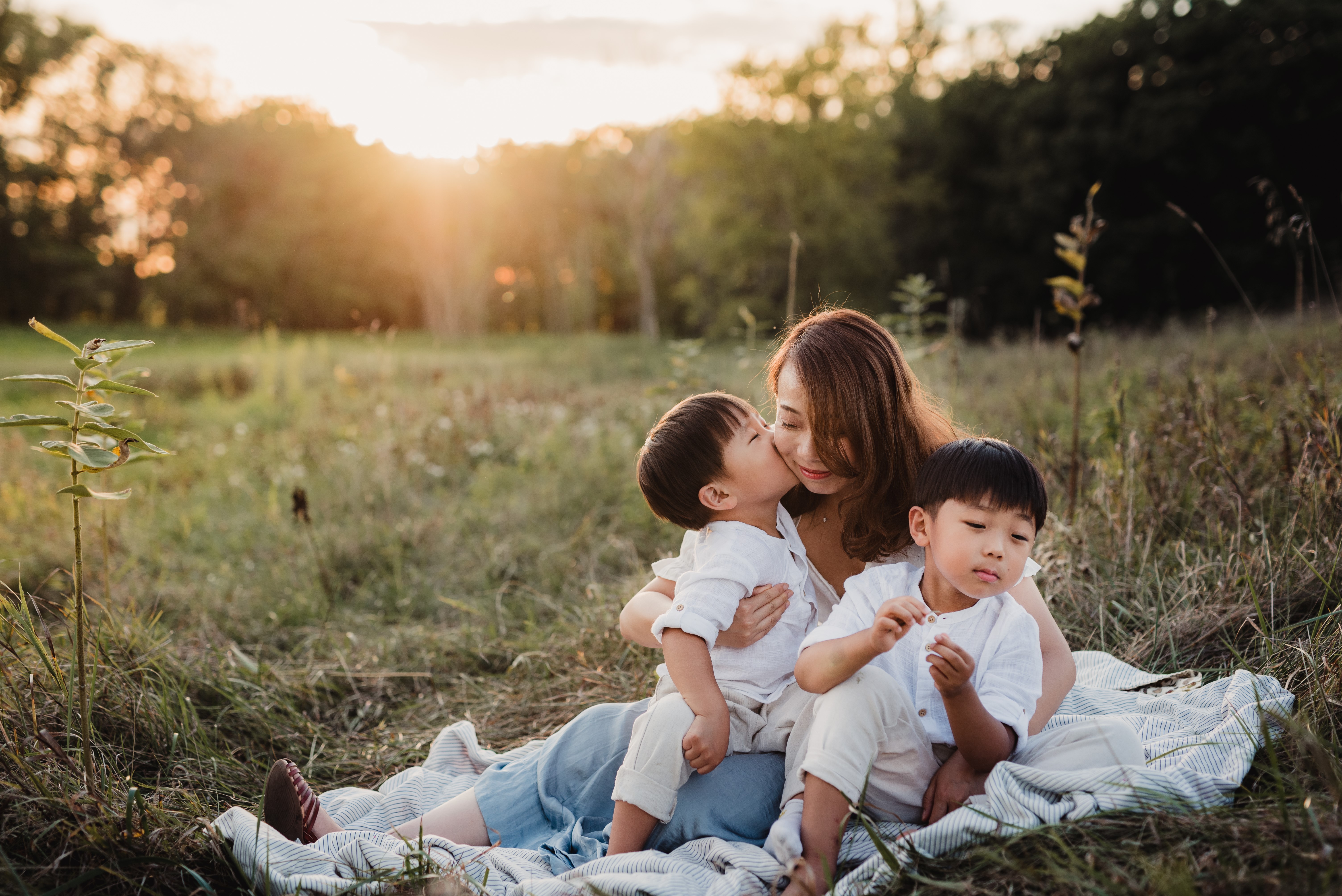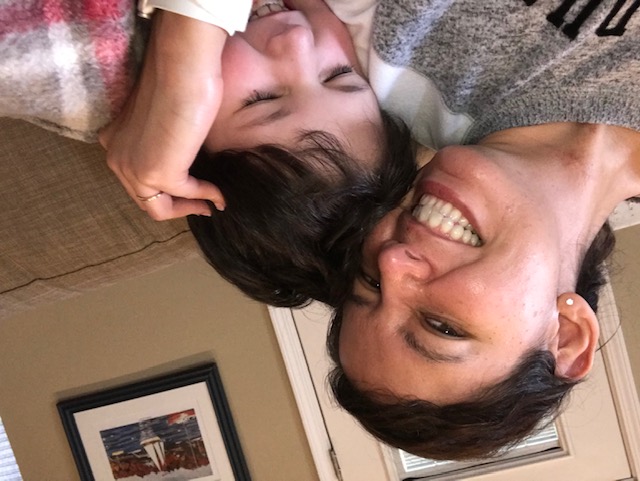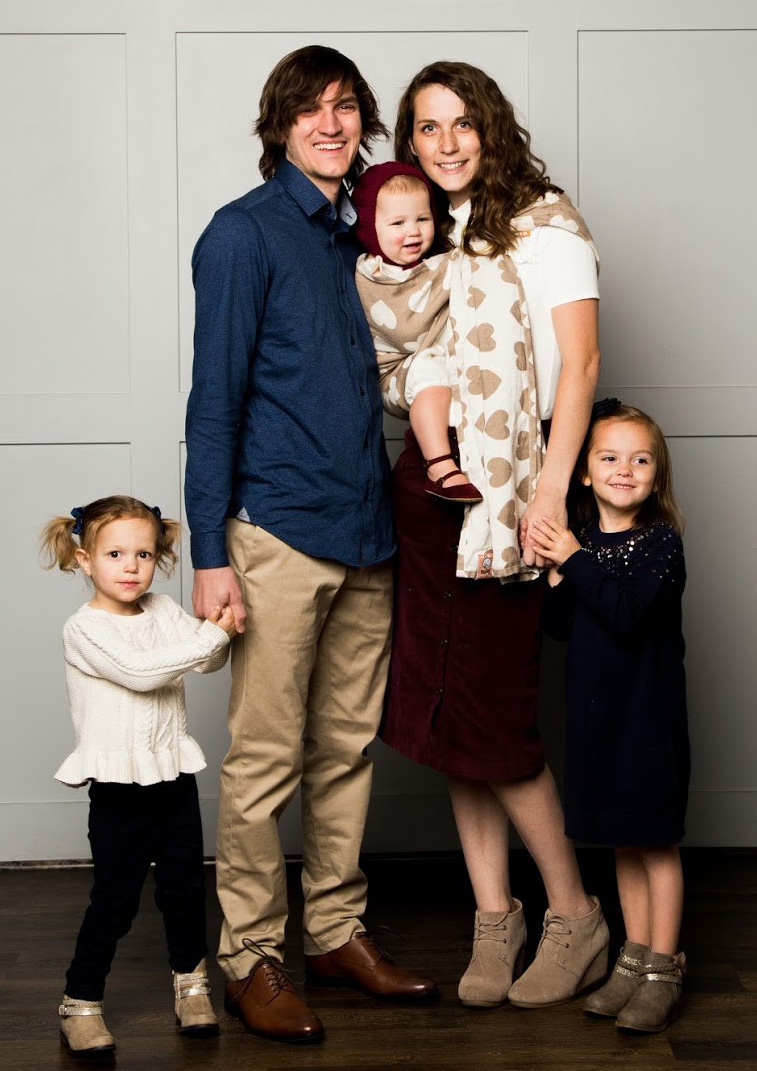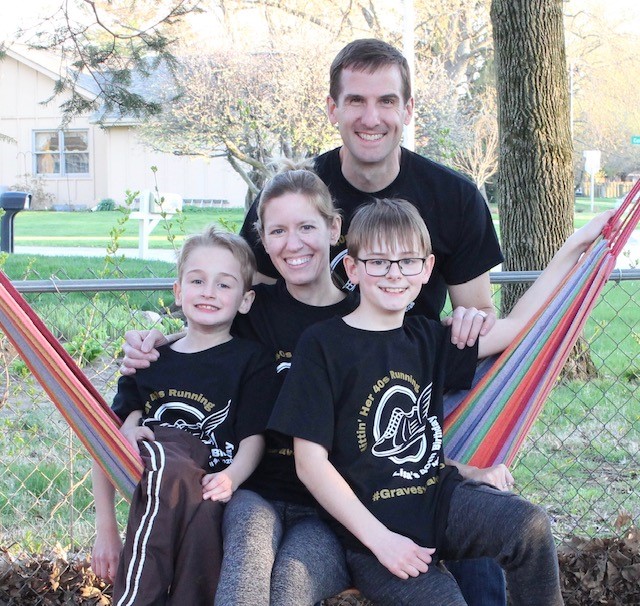Graduate student parents persevere in spite of pandemic-induced chaos and isolation
Many graduate student parents are taxed to the limit on a good day. They juggle multiple roles: parent, student, and part-time or full-time employee. Some are the breadwinners of their families. Many live far away from familiar support systems and are building new ones. International graduate student parents have the added test of navigating a foreign culture, language, and institutions.
When the pandemic started, it was especially disruptive to graduate student parents. When Purdue shut down in the spring of 2020, daycares and schools also closed. Children were home 24-7, and parents found themselves isolated professionally and socially and scrambling to establish new routines for school, childcare, work, and family life.
While there were some pluses that came with the pandemic, such as more time at home with the family and smiling faces popping up in the middle of the day, many graduate student parents have been pushed to their breaking point. With grit and determination, the students featured in this story are persevering, but it hasn’t been easy.

Linlin Li (center), a PhD candidate in the Weldon School of Biomedical Engineering at Purdue University, shown here with her twin boys, juggled the roles of full-time parent, research assistant, and temporary lab technician in the throes of the pandemic.
“Life doesn’t always happen as you plan, but you just get through it.”
Linlin Li is a 5th-year PhD student in the Weldon School of Biomedical Engineering. She works on mathematical modeling of the protein signaling networks in the zebrafish embryo. Models like these could one day be used to predict other cell behaviors, such as the behaviors of cancer cells in humans.
Li has five-year-old twin boys. Her husband works out of state during the week, and their families live abroad. So, when the preschool the twins attended closed, it fell to Li to assume the roles of full-time caregiver and preschool teacher, trying to prepare her boys for kindergarten, while maintaining her graduate research.
She worked with interruptions: during virtual meetings, the boys knocked on the door repeatedly to ask what she was doing. She worked within segmented chunks of time: she set her code to run while she spent time with the children, but when she came back, it would be hard to remember what she was doing.
Ultimately she wound up doing most of her research at night after putting the boys to bed, working between the hours of 9 pm and 2 am. After a few hours of sleep she would get up and do it all over again. She kept up this grueling schedule for six months.
Then in September 2020, the pandemic delivered another blow. The postdoc who conducted the lab experiments that provided the data that Li was processing left abruptly due to COVID-related visa issues.
“I just tried to take over her work,” Li said, noting that she had only two weeks to learn the ropes by video. “I didn’t have a lot of lab experience before. It was very stressful.”
For a period of two months, she became a stand-in technician running the lab experiments.
The fallout from the pandemic set Li back in more ways than one. Academically, she fell behind a semester. She had planned to graduate in 2020, but now has her sights set on May 2021.
As a parent, the experience was less quantifiable. “Sometimes I feel I missed a lot of their cute times. During the quarantine, sometimes I am in a bad mood. I feel like something is coming up for me, and I have to put it down. It is difficult,” Li said. “It is quite challenging as a student to have kids. Life doesn’t always happen as you plan, but you just get through it.”
Much has improved for Li and her family since her children’s daycare reopened. She can focus now on preparing for her defense and expects to take a postdoc position after graduation in preparation for her career goal of a faculty position.

Nakima McCormack (left), a master’s student in the School of Health Sciences at Purdue University, her two daughters, and her son (right), were all navigating virtual learning from home during the pandemic.
“It just leaves you feeling trapped, isolated, and alone.”
For Nakima McCormack, the pandemic upended the well-oiled routine of her entire family. McCormack is a 2nd-year master’s student in the School of Health Sciences. She is studying health physics, a field concerned with the protection of workers from occupational exposure to radiation. While her current focus is the master’s program, McCormack is also a radiation health officer on active duty in the military. She and her husband have three children, two girls, ages 16 and 14, in high school, and a 9-year old boy in elementary school.
“I’m a very organized person. I do well and am adjusted to having a routine. Having a plan and knowing what takes place and being organized is how I get through my day,” McCormack said. “But with COVID, I didn’t know what to expect at all on a daily basis, and I certainly didn’t know what to expect from this week to next week. The whole spring of 2020 felt completely chaotic.”
McCormack and all of her children were thrown into virtual learning for the spring 2020 semester. While she had to be much more hands-on to ensure her youngest child’s educational requirements were met, she had less time for her own classes and student leadership commitments. A final lab assignment in the spring of 2020 led to a breaking point for McCormack.
“The last lab was super confusing and did not translate well to video demonstration. I think between the amount of time that we had been out at that point, the frustration of the uncertainty of trying to manage my schedule and what was going on with the kids, when the instructor was going over things on the day the lab was due and then expected us to make changes to the lab report based on the additional information that she had given us that day…, I was less than accepting of that. I refused to make changes to my lab report. It was very difficult at that point.”
Although the children have returned to in-person school and some things have gotten better, there are random quarantine periods and a routine still feels elusive. McCormack said a profound sense of isolation compounded the disruption of the past year.
“I think the biggest difficulty has been the overwhelming feeling of isolation. As graduate students, we are all away from our regular support systems of people who understand us and the challenges we face. We uproot ourselves and our families to go to graduate school, losing these established support systems for ourselves and those of our children,” McCormack said.
The isolation is challenging in the best of times, she said, but the pandemic not only took away the opportunity to visit with family and friends, it made it harder to make new friends for both her and her children through after school activities, volunteering, and other in-person activities.
“It just leaves you feeling trapped, isolated, and alone. It's such a horrible feeling, but it's even worse when you see it in your kids too knowing there isn't much you can do about it. When you add uncertain schedules, virtual school, unexpected quarantine periods, and all normal life as a parent, and then as a graduate student on top of the overwhelming feeling of being isolated and cut off, some days even doing a relatively simple homework assignment feels like an impossible task. Even when homework doesn't feel impossible, assignments take so much longer than they did before,” McCormack said.
McCormack said that over the course of the last year, daily life has improved since schools re-opened for in-person learning in fall 2020 and now that everyone is practiced and knows what the expectations are for virtual learning days. Even unexpected shifts to virtual learning come with less stress than they did initially. Parts of the pre-pandemic family routine are slowly returning.
McCormack is not alone. While each student’s experiences are unique, all of the students interviewed for this story commented on the impacts of isolation brought on by the pandemic.
Jeremy Cadiente (top right), a PhD student in the Department of Physics and Astronomy at Purdue University, and his family experienced pandemic-induced isolation professionally and socially.
“This has just taken a toll on people’s psyche.”
Jeremy Cadiente is a 2nd-year PhD student in the Department of Physics and Astronomy studying quantum computing. He is also an officer in the military and works full time in the Reserve Officers' Training Corps (ROTC). Cadiente and his wife have two young boys, one under a year and the other just over a year old. The pandemic isolated Cadiente from his lab at Purdue, which was just getting started as he arrived to study at Purdue in the fall of 2019.
When establishing a lab group, “you are supposed to have time to build that camaraderie, build that teamwork, build that dynamic between the research advisor, the graduate student, and the undergraduate student. Trying to do that with a brand new lab (during the lockdown) was not ideal. At the end of the day, we’ll get past it, but it definitely slowed down progress. It slowed down teamwork and dynamics and camaraderie amongst the lab, and it slowed down overall research,” Cadiente said.
At home, Cadiente’s entire family suffered from the isolation. “We just moved to a new neighborhood, and we don’t know anyone,” Cadiente said. “We’ve never lived in the Midwest, in our neighborhood, or worked in the places where we are working. So, we are at a point of basically trying to connect with our community, and just kind of being unable to. The isolation was a major thing for us, which plays on the emotional, psychological, mental life.” But Cadiente was grateful for the extra family time: “My time with my family went way up because I was working remotely, which was a good thing for me, especially coming from a submarine where we are often deployed; that was a good change of pace.”
Cadiente also works as an advisor and noticed the impact on student morale: “One of the most surprising things to me personally is how much this has just taken a toll on people’s psyche, which is not something I anticipated. Once we got into the classrooms and had masks on and social distancing and all the protocols, people were just different. People were sad. A lot of people, just because of the isolation, it took a hit to their morale.”

James Decker (top left), a PhD student in the Department of Computer Science, had moved with his family from West Lafayette to California just before the shutdown.
“I don’t know if I’m going to be able to make these deadlines.”
Another commonality among all of the students interviewed for this story was gratitude for the steps taken by Purdue, by their advisors, and by their peers for providing extensions, accommodations, and support.
James Decker is a 5th-year PhD student conducting research on compilers and programming languages in the Department of Computer Science. He also works full-time at a tech start-up in California and is a visiting researcher at Stanford University. Decker and his wife have three daughters, ages 6, 4, and 2.
Decker moved his family of five from Purdue to California in February 2020. A month later everything shut down.
“I need to give credit to my PhD advisor. Relatively early on in the pandemic I was feeling very stressed and overwhelmed and reached out and said, ‘I don’t know if I’m going to be able to make these deadlines.’ He wrote back and said, ‘That’s fine, that’s totally fine. We can always hit the next deadline. Take care of yourself, take care of your family.’”
It was the lifeline he needed, an important reminder that some things are more important than others.
Cadiente had a similar experience: “The physics department and my research advisor were really good at just making sure that everyone felt like whatever they needed to do to stay safe, whatever risk they felt comfortable taking, essentially, they had the means to do. No one was forced to do anything. I felt like they definitely were being proactive about anticipating all the different complications and changes and putting things in place to make sure we can keep doing physics. I thought the support was great and the operations at Purdue were great.”
Li credited an understanding PI for helping to make the pandemic survivable as well as being in a lab group with other graduate student parents who can count six children among them.
As for McCormack and that lab report that she refused to change? Her professor was OK with it. “I think all of the professors were pretty understanding of the frustrations on our part as well as the frustrations on their part,” McCormack said. “I'm grateful that the professors I've had since COVID have been understanding and accommodating. I'm grateful that the kids and I have all had the option for in-person classes that help us feel a little less isolated and alone.”

Lisa Graves (center), a PhD student in the Department of Nutrition Science at Purdue University, and her family took regular breaks for physical activity and tried to stay connected safely with faith, family, and friends, as they navigated a “new normal” during the pandemic.
“We’re still navigating this new normal one day at a time.”
Lisa Graves (BS ’02) is a 1st-year PhD student in the Department of Nutrition Science. She is also an assistant program leader for Purdue Extension in the College of Health and Human Sciences.
“Like many others, I had to learn to navigate working and taking classes from home, setting up workspaces with my husband who also transitioned to working from home, and navigating remote learning with my then 5th-grade and 1st-grade boys. I have felt supported by Purdue University as an employee and a graduate student,” Graves said.
Graves and her family have managed the pandemic by staying connected safely with faith, family, and friends and by prioritizing physical activity. “Taking short breaks throughout the day has been key for us as a family. We have taken a walk or gone for a run almost every day. We learned how to play spikeball. We had water balloon fights in the backyard. Even a year later we’re still navigating this new normal one day at a time,” Graves said.
Beyond coursework, labs, research, publishing, teaching, and service positions, graduate student parents are managing all the additional stresses, responsibilities, and short- and long-term uncertainties that any working parent must manage during the pandemic—and all are magnified exponentially by the number of people sharing one’s house.
“It’s stressful because you have all those things on your mind,” Li said. “I need to graduate. I need to get my kids ready for kindergarten. I am looking for a postdoc position. What am I going to do next? It’s on my mind. It’s not really the work that keeps you stressed. It’s all those other things on your mind.”
Resources for Graduate Student Parents
A few years ago the Graduate School launched an organization to support graduate students like Li, McCormack, Cadiente, Decker, and Graves. The Graduate Parent Support Network (GPSn) is an organization committed to supporting Purdue's graduate students with families by creating a sense of community and connection for this unique set of graduate students. GPSn helps graduate students with children navigate school-related issues and identify helpful resources, and it provides a platform for students to express their concerns and share their experiences. If you are looking for the opportunity to join a family-friendly community of graduate student parents that are dedicated to improving the Purdue graduate experience, please contact gpsn@purdue.edu for more information.
Writer: Korina Wilbert, kwilbert@purdue.edu